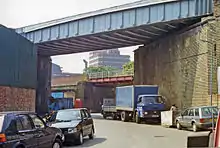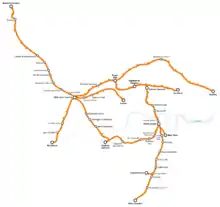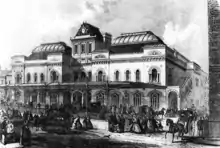East Brixton railway station
East Brixton railway station was a railway station on the South London Line from London Victoria to London Bridge. It was located next to the rail bridge over Barrington Road, near Coldharbour Lane, in Brixton, London and closed in 1976.
East Brixton | |
|---|---|
.JPG.webp) Station in 1963. | |
| Location | Brixton, South London, London Borough of Lambeth England |
| Coordinates | 51.4636°N 0.1073°W |
| Platforms | 2 |
| Other information | |
| Status | Disused |
| History | |
| Original company | London, Brighton & South Coast Railway (LBSCR) |
| Post-grouping | Southern Railway |
| Key dates | |
| 1866 | Opened as Loughborough Park |
| 1870 | Renamed Loughborough Park and Brixton |
| 1894 | Renamed East Brixton |
| 5 January 1976 | Closed |
History
East Brixton opened in 1866 as Loughborough Park. It consisted of two platforms with wooden buildings on high piers next to the railway viaduct. In 1870 the station was renamed Loughborough Park and Brixton, before it was finally renamed East Brixton in 1894.[1] Passenger services were operated by the Southern Railway and after nationalisation by the Southern Region of British Railways.
The station was included in a proposal published in 1905 by the Australian engineer Elfric Wells Chalmers Kearney for an underground monorail-type railway. The plans for the Kearney High-Speed Railway envisaged running a tube line from Cricklewood via central London, Brixton and Herne Hill to Crystal Palace, but were never realised.[2]
East Brixton station made a brief appearance in the 1948 comedy film A Date with a Dream. It is seen in the background of a scene in which two soldiers (played by Len Lowe and Bill Lowe) walk along Barrington Road.[3]
Decline and closure
Over the years the station became progressively neglected and lost passengers from 1971 when Brixton Underground station opened nearby as the southern terminus of the new Victoria line. With declining passenger numbers and the station requiring extensive repairs to the wooden platforms and buildings it was decided that the expense was not justified. There was a fire in 1975 which temporarily closed the station but the station reopened and was finally closed on 5 January 1976.[4] The platforms and its buildings were demolished shortly after closure. Nothing now remains of the station at track level: there are some arches and windows in the viaduct of the still used line.
Future Proposals


Between 2005 and 2012, most of the South London Line was incorporated into the London Overground network as part of the East London line extension project to create an orbital railway around London.[5][6]
Westbound London Overground services run along this section of the line as far as Wandsworth Road and then branch off at Heathbrook Park, passing through Battersea towards Clapham Junction. This route crosses over Loughborough Junction and Brixton stations[7] and the plans have been criticised for missing opportunities to create new interchange stations with Thameslink services and the London Underground Victoria line respectively.[8][9] Under current proposals, no stations are planned at these locations as the line is on high railway arches, making the cost of any station construction prohibitive.[10] It has been suggested that a re-opened East Brixton station could provide a form of interchange with the Victoria line and Thameslink as it would be located almost exactly in the middle of the two lines. This was the subject of a petition to parliament in 2014.[11][12] In March 2017, Lambeth Council started a review to see if there was a business case for reopening the station. The council is currently working with Transport for London and Network Rail.[13]
In August 2018, the Liberal Democrats along with London Assembly member Caroline Pigeon called for the reopening of East Brixton.[14]
Maps
 A 1908 Railway Clearing House map of lines around East Brixton railway station
A 1908 Railway Clearing House map of lines around East Brixton railway station 1914 railway junction diagram showing the former East Brixton Station
1914 railway junction diagram showing the former East Brixton Station The London Overground network; East Brixton is between Denmark Hill and Clapham High St[15]
The London Overground network; East Brixton is between Denmark Hill and Clapham High St[15]
References
- "East Brixton". Disused Stations. Subterranea Britannica. 2 November 2007. Retrieved 25 August 2008.
- Badsey-Ellis, Antony (2005). London's lost tube schemes. Harrow: Capital Transport. p. 259. ISBN 1854142933.
- James, Simon R.H. (2007). London film location guide. London: Batsford. p. 131. ISBN 9780713490626. Retrieved 21 December 2012.
- Anson, Terry Gourvish ; research by Mike (2004). British Rail, 1974-97 : from integration to privatisation (Paperback ed.). Oxford: Oxford University Press. p. 62. ISBN 9780199269099.
- "Clapham Junction to Surrey Quays". Transport for London. Retrieved 6 November 2012.
- "Outer London rail orbital opens for passengers". BBC News. Retrieved 14 December 2012.
- "2010 Tube map". Transport for London. 2007. Archived from the original on 1 October 2007. Retrieved 21 August 2008.
- "Junction joy South". South London Press. 24 April 2004. Archived from the original on 9 May 2004. Retrieved 3 November 2007.
- Martin Linton MP (19 July 2006). "Parliamentary Debate: London Orbital Rail Network". Hansard. Retrieved 3 November 2007.
- "East London Line Extensions - Loughborough Junction". AlwaysTouchOut. 9 November 2006. Retrieved 3 November 2007.
- "Connecting Brixton to the London Overground. Petition launched to reopen East Brixton station". Brixton Buzz. 18 February 2014.
- "Then and Now: East Brixton station". Urban75. Retrieved 25 August 2008.
- Cobb, Jason (21 March 2017). "Lambeth Council starts review to look at business case for reopening East Brixton train station". Brixton Buzz.
- http://www.lambethlibdems.org.uk/demand_better_connections_for_brixton
- "Geographical map of London Overground 2010". Transport for London. November 2007. Retrieved 21 August 2008.
Further reading
- Butt, R.V.J. (1995). The Directory of Railway Stations. Patrick Stephens Ltd. ISBN 1-85260-508-1.
| Preceding station | Disused railways | Following station | ||
|---|---|---|---|---|
| Clapham High Street | British Rail Southern Region South London Line |
Denmark Hill |
